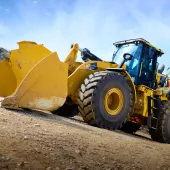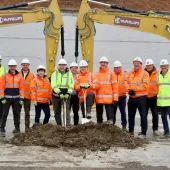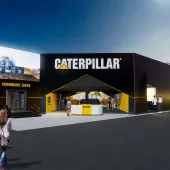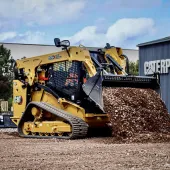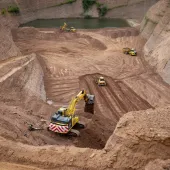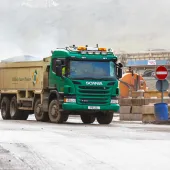MQP adopt a new approach at Cliffe Hill Quarry

Flagship site set to become first UK quarry to run a technology-managed rebuilt prime mover fleet
WHEN Midland Quarry Products (MQP) started to look at how they could improve the running of their flagship Cliffe Hill Quarry in Ellistown, Leicestershire, instead of opting for a big fleet renewal programme they decided to take a different and much more integrated approach to the operation.
This involved a completely new, multi-million-pound tailored technology and rebuild deal with Finning, incorporating drone technology with Eco-Drive training, equipment monitoring and the rebuild of the company’s existing prime mover fleet on site.
Financed through Cat Financial, the deal has seen MQP’s current Cat fleet retrofitted with Caterpillar’s Truck Production Management System (TPMS).
This solution has, in turn, been connected to the Cat MineStar productivity monitoring technology, which collects all of the data from each of the existing four Cat 775F Off Highway trucks and the Cat 992K wheel loader used on site.
The reason why this technology was immediately fitted to Cliffe Hill’s fleet of prime movers relates to the new approach being taken by MQP, which has been developed in collaboration with experts from the Finning Managed Solutions (FMS) and Caterpillar Job Site Solutions (JSS) teams.
Combining this new data with information collected from the machines as part of the previous on-site service support package, also delivered by Finning, a model of the health of each machine will be created. This will help the FMS and JSS teams to optimize the time to conduct the rebuild repower strategy for each machine.
This strategy is key to the delivery of MQP’s used-equipment fleet vision, as significant savings will be made on the overall life-cycle cost of running the fleet, in comparison with purchasing new equipment.
With the rebuild process set to commence in 12 months, and with work staggered over a further 12-month timeline, in two years’ time Cliffe Hill will be the first UK quarry to run a technology-managed rebuilt fleet.
To support this time frame and approach, MQP have also become the first UK quarry to incorporate Redbird drone technology into their vision, in co-ordination with a team approach to Eco-Drive training, which includes managers and operators.
Data from the drone flights and equipment is being analysed by the FMS team to improve efficiencies and allow for informed decisions to be made for future layouts of the quarry as it develops.
For example, GPS information from machine alerts, including breaking and acceleration patterns, are already being combined with drone survey data to spot opportunities to make changes to haul roads.
This all forms part of a joined-up approach to technology and the ongoing development of skills within the operator and manager community, with telemetry data shared to deliver on the technology-backed efficiency gains targeted for the site.
According to MQP’s operations director, Phil Bradshaw, the company’s new approach is all about extracting material at the lowest possible cost per tonne, taking into consideration the people and costs associated with running the equipment.
‘By structuring the solution to give Finning responsibility for the uptime and maintenance of the equipment in one fixed monthly payment, through Cat Financial, the only variable we must deal with is fuel,’ he remarked.
‘So, it is in all our interests to make sure the overall operational costs are kept to a minimum and in order to achieve this, whilst also enhancing health and safety on site, we have also built in support for our people with EcoDrive operator training.
‘But the real step change is the retrofitting of TMPS and the connection to Cat MineStar. This will be the beating heart of our new approach as we make the transition from downloaded data to dynamic dashboard-driven monitoring, all supported by the ‘eye in the sky’ that is Redbird drone technology and the FMS and JSS team,’ explained Mr Bradshaw.
‘Essentially, this will fundamentally change the way we operate the site. Operators and managers will be able to monitor production throughout the day, with commercial decisions made possible in a matter of minutes. Weekly meetings with the dedicated FMS performance manager to review production trends and asset utilization will maintain focus on tactical operational decisions.
‘To ensure we all stay on track, the whole team meet quarterly to review performance against KPI targets and to analyse where improvements can be made and ultimately reduce the costs of extraction. This more detailed analysis includes: site conditions, all recorded data and feedback from operators, which all have an impact on productivity, efficiency and, most importantly, health and safety.’
He continued: ‘It’s an exciting proposition that has really come together thanks to the original repair, maintenance and improvement (RMI) contract signed with Finning in 2010, which saw the existing fleet brought into the quarry.
‘Because Finning have looked after this equipment ever since, both businesses were confident that we had the information needed to give the units a second life with the rebuild and repower process. So now we will be running the units for a further 17,000 hours to achieve an impressive 30,500-hour goal.’



